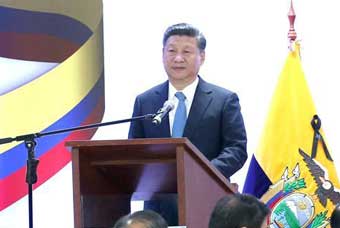By sports editor Spencer Musick
BEIJING, Jan. 11 (Xinhua) -- Team China's 2-0 loss to Iceland at the inaugural China Cup last night certainly feels a little disheartening on the surface. It is never easy for a hosting country to lose in front of a home crowd, but we must always keep in mind the bigger picture.
China's pursuit of its football dream will be a long slog, and last night's result is just one of what will likely be many bumps in the road as China chases after footballing glory. What matters is not the outcome of individual matches, but rather what China -- and its athletes at all levels of the game -- can glean from its experiences on the world footballing stage.
Despite last night's loss, there are indeed many reasons for Chinese football fans to be hopeful for the future.
First of all, China's performance in last night's match had its bright spots, even if we came up short in the end. Iceland head coach Heimir Hallfrimsson admitted that the reigns were slipping away from his side in the first half of the match, and said that it was only in the second half that things really started to come together.
It is also worth pointing out that Team China were able to create a couple of chances, even if Icelandic goalkeeper Hannes Halldorsson managed to foil them. These missed chances are valuable; they create unique learning opportunities for Chinese players that could not have happened without the international setting provided by the China Cup.
Off the pitch, there are reasons to be optimistic as well. Although qualification for Russia 2018 remains a long-shot for Team China, that is very likely to change in future editions of the World Cup. World football governing body FIFA have shown a commitment to taking concrete steps to democratize the sport and allow teams from outside the traditional powerhouse regions of Europe and South America to compete.
On the same day as Team China's defeat at the hands of Iceland, FIFA's council unanimously voted to widen the scope of the World Cup to include 48 teams, a change that will come into effect for the 2026 edition. This expanded field (which will split the teams into 16 groups of 3 vying for a 32-team knockout stage) will make it much easier for countries like China to reach the qualifying spots. Given the increased focus that China promises to place on football development in the intervening time between now and 2026, its inclusion at that edition if the Cup is an attainable goal.
China is ticking all of the right boxes to create a recipe for footballing success: building youth training centers to identify and foster homegrown talents, building thousands of pitches across the country, and opening the floodgates for investment in marketing and broadcast opportunities in a bid to create an economy driven by increasing public interest in the game. China's football dream is an ambitions and laudable goal, and with all of the factors above working in tandem, China can foster a self-sustaining football ecosystem that will fuel its growth into a powerhouse. It will not be easy, but nothing worth having ever comes easily.
China is playing the long-game when it comes to developing football in the country. No country can go from 'also-ran' to powerhouse overnight in any sporting discipline. The task ahead will take time, patience, effort and determination, but all signals indicate that China is ready to go the distance on the road to success at the highest levels of world football.














